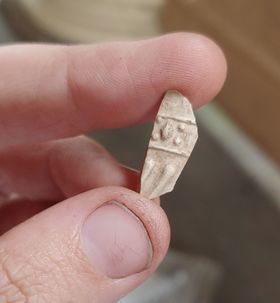
I knew I wanted some hands-on experience before officially working in the field. I like how this showed me that I do love the actual digging part of archeology. The experience really solidified it for me.
Growing up in southwestern New Hampshire, Elliot Darowski, ’26, spent his days dreaming about becoming a paleontologist; he wanted to travel the world to unearth dinosaurs.
Things shifted in middle school when Elliot began to gravitate toward history. Soon he discovered a new passion, archaeology.
“History and culture...dinosaurs don’t have culture, but humans do,” he said. “That’s ultimately what drove me toward the field. I love digging up history, I love trying to figure out what something means, solving the mystery.”
Elliot, an archeology and anthropology major recently had the opportunity to dig up some local history when he participated in a research program offered through Bridgewater State University’s anthropology department.
The five-week program, led by Professor Dr. Michael Zimmerman, met over the summer to perform field work at the James and Sarah Arnold Mansion and Grounds in New Bedford.
James Arnold, a successful businessman and one of the founders of the New Bedford Horticultural Society, and his wife Sarah lived in the mansion in the early 1800s.
The property is currently a contributing property to two separate National Register districts, and in 2016 James Arnold Mansion Inc. was formed to preserve the historic significance of property.
During the dig this summer, students uncovered a variety of interesting items, including an engraved coat button and pieces of smoking pipes dating back to the 1800’s.
After carefully collecting the items, students conducted research to determine what each item was before cataloging it and sending it all off to the Massachusetts’ Historical Commission.
“It was a very rewarding summer,” Zimmerman said.
Nearly 20 students traveled to the New Bedford site as part of a community outreach initiative.
Administrators at the James and Sarah Arnold Mansion and Grounds are planning to create green spaces, but first needed to make sure they weren’t damaging any important historic artifacts that may be hiding underneath.
“Our work is similar to environmental engineers, it’s in the same vein,” Zimmerman said. “With projects like this, you have to comply with environmental laws and cultural research.”
Since the bi-partisan Infrastructure Act passed in 2021, that provided federal funding for infrastructure jobs across the country, jobs in this field are in high demand.
“This type of field work is valuable in a rapidly growing field,” Zimmerman said. “I expect it to grow exponentially within the next 10 years.”
For students to get hands-on experience puts them ahead of their peers pursuing similar positions post-graduation.
“Not only does it give them an edge but is required for these types of jobs,” Zimmerman said. “You have to have experience in field work and field research. We want to provide our students with as many skills for their future careers as we can.”
The hands-on experience helped solidify for Elliot that he is on the right track in terms of a career. After Bridgewater, he hopes to travel to Canada, where global warming is melting ice in some areas and revealing pieces of forgotten history, therefore providing even newer mysteries to solve.
“I knew I wanted some hands-on experience before officially working in the field,” he said. “I like how this showed me that I do love the actual digging part of archeology. The experience really solidified it for me.”
Do you have a BSU story you'd like to share? Email stories@bridgew.edu
